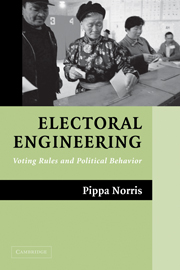Book contents
4 - Party Systems
Published online by Cambridge University Press: 05 September 2012
Summary
Effective parties that work well can serve multiple functions in democracies: simplifying and structuring electoral choices; organizing and mobilizing campaigns; articulating and aggregating disparate interests; channeling communication, consultation, and debate; training, recruiting, and selecting candidates; structuring parliamentary divisions; acting as policy think tanks; and organizing government. The direct impact of electoral systems on patterns of party competition has long been regarded as one of their most important effects. Electoral engineering has been advocated in nations suffering either from the dangers of excessively unstable and fragmented party systems, such as in Italy and Israel, or from the opposite dangers of unchanging one-party predominant systems, exemplified by Singapore and Japan. But, potentially, electoral systems can indirectly affect many other features of how parties work, such as the strength of bonds between citizens and parties and how far party identification shapes voters' choices. In this chapter, therefore, I explore how far electoral systems are systematically related to patterns of party competition. In subsequent chapters, then, I examine the relationship between electoral systems, the strength of party identification, and general orientations toward political parties, as well as to what extent partisan alignments influence voter decisions in the countries under comparison.
The Mechanical Effects of Electoral Systems on Party Competition
The classic starting point for any analysis has to be Duverger's famous claims about the relationship between electoral systems and party systems. Duverger's first law is: (1) “the plurality single-ballot rule tends to party dualism.”
Information
- Type
- Chapter
- Information
- Electoral EngineeringVoting Rules and Political Behavior, pp. 81 - 95Publisher: Cambridge University PressPrint publication year: 2004
Accessibility standard: Unknown
Why this information is here
This section outlines the accessibility features of this content - including support for screen readers, full keyboard navigation and high-contrast display options. This may not be relevant for you.Accessibility Information
- 1
- Cited by
